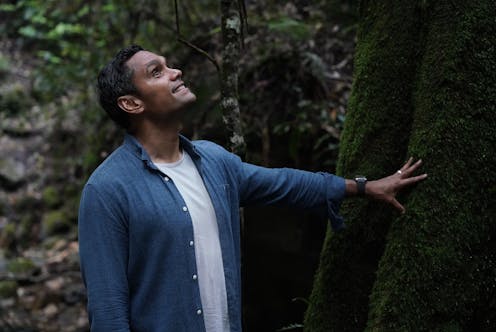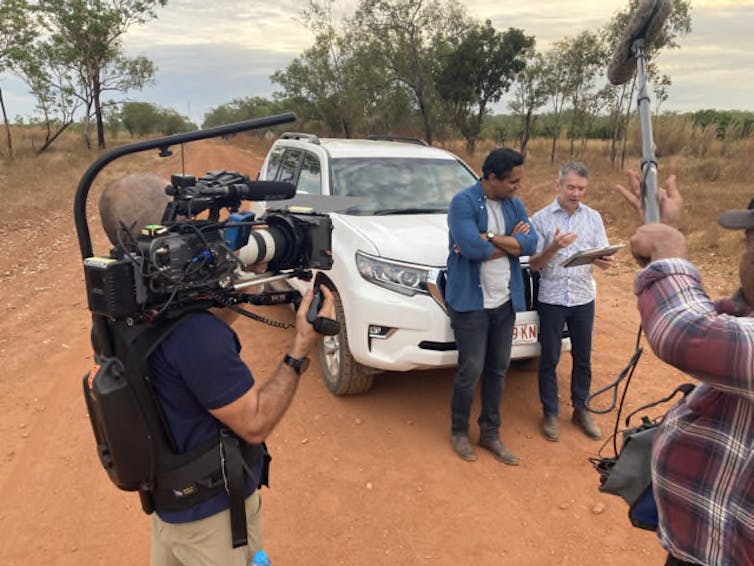
First Nations cultures and languages are being revitalised around the country. More non-Indigenous Australians are becoming interested in what Indigenous knowledges can teach us today.
The First Inventors is a new documentary series bringing Indigenous knowledges and technologies from communities across the continent to audiences. The series premieres on NITV and Network 10 on Thursday 15 June.
The three of us became involved in The First Inventors in early 2020 (Behrendt as a writer and then director; Ulm as deputy director and McNiven as a chief investigator of the Australian Research Council Centre of Excellence for Australian Biodiversity and Heritage, the principal research partner for the series).
The series follows story lines across the continent and across the skies. It explores how people transformed the continent through management and story. It covers navigation, aeronautics, kinship, memory, trade, communication and much more.
Historically, First Nations peoples in Australia have been falsely represented as simple, uninventive, and isolated. This view has been thoroughly discredited by decades of partnership research between First Nations peoples and non-Indigenous researchers.
There are many ways Indigenous and Western ways of knowing can work together collaboratively and respectfully to better understand Australia’s past and future needs.
Indigenous technologies and knowledges
Aboriginal and Torres Strait Islander peoples have diverse knowledges, languages, social systems, technologies, cultures and histories spanning over more than 65,000 years.
This includes the exploration of practices such as using fire technologies to maintain open grasslands to increase animal stocks in northern Tasmania and digging canals and constructing weirs across lava fields to farm eels in southwest Victoria.
There have also been new archaeological discoveries of pottery made on Jiigurru (Lizard Island) in north Queensland which reveals connections between First Nations peoples and New Guinea Melanesians for at least 2,000-3,000 years.
Such revelations are not new to Torres Strait Islanders who know their ancestors used huge ocean-going canoes to travel hundreds of kilometres to share objects and ideas between the mainlands of Australia and New Guinea long before James Cook arrived.
Read more: Indigenous technology is often misunderstood. Here's how it can be part of everyday life
Some First Nations peoples are using traditional fire technologies to protect biodiversity and in carbon abatement programs, and using knowledge of the medicinal properties of plants to develop new health products.
Cultural flexibility, inventiveness, and adaptability saw First Nations people in Australia thrive through periods of major environmental change in the past. This includes an Ice Age that ended with flooding of 2 million square kilometres of the continental shelf. This required people to move hundreds of kilometres inland sometimes over only a few generations and adapt to entirely different environments.
Read more: This rainforest was once a grassland savanna maintained by Aboriginal people – until colonisation
The First Inventors
Much of the content of The First Inventors focuses on knowledges and sciences in Indigenous knowledge systems, so the content is very strongly cultural. Listening to First Nations voices brings forth great reservoirs of ancestral knowledge and experience.
The series provided a space and platform where Indigenous people reclaimed the storytelling authority for their own stories, histories, and perspectives.

The series was a challenging project, because we had to produce content for two different audiences.
For a First Nations audience, it is a celebration of the resilience and wisdom of our cultures.
For a broader audience, it is a unique glimpse into the technology and science that sits in First Nations knowledge systems.
The themes of the series look toward the future, exploring how Indigenous knowledges are as relevant today as they have been in the past – and how they might help us navigate the future.
This project requires Australians to understand how sophisticated Aboriginal and Torres Strait Islander cultures are. This is crucial as Australia engages in big national conversations about voice, truth, and treaty.
The First Inventors tackles head on the importance of reconciliation and truth-telling. In breaking the shackles of our colonial past to reveal the extraordinary complexity, inventiveness and resilience of First Nations peoples in Australia.
The First Inventors premieres NITV and Network 10 on Thursday 15 June.
Larissa Behrendt receives funding from the Australian Research Council.
Ian J. McNiven receives funding from the Australian Research Council.
Sean Ulm receives funding from the Australian Research Council.
This article was originally published on The Conversation. Read the original article.







